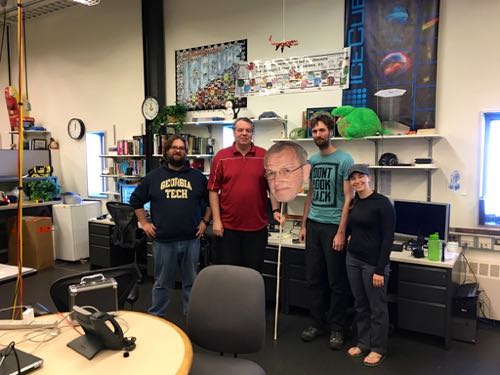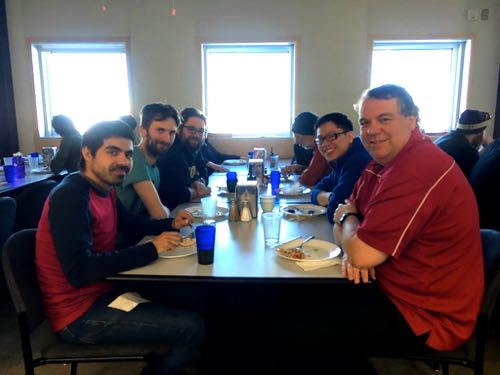Journal Entry
The Gang
I want to introduce you (in no specific order) to the team I’ll be working with while I’m here. I hope you learn a little bit about each person. They're such interesting, kind, hard-working people and I'm humbled to work alongside them while I'm here.
 Some of the IceCube team hanging out in the Lab. From left to right: James Casey, Mike DuVernois, Francis Halzen (as a head), Samuel Flis, Kate Miller.
Some of the IceCube team hanging out in the Lab. From left to right: James Casey, Mike DuVernois, Francis Halzen (as a head), Samuel Flis, Kate Miller.
 Some of the IceCube team grabbing lunch in the Galley. From left to right: Michael Larson, Samuel Flis, James Casey, Ming-Yuan Lu, Mike DuVeronis.
Some of the IceCube team grabbing lunch in the Galley. From left to right: Michael Larson, Samuel Flis, James Casey, Ming-Yuan Lu, Mike DuVeronis.
Jim Madsen (not at the South Pole yet)
- Grew up in Racine, WI; Mostly lives in River Falls, but spends time in Madison, WI and also travels a lot with this job
- Professor and Chair of Physics Department at the University of Wisconsin at River Falls; Associate Director for Education and Outreach on IceCube
- Coming to the South Pole for the Neutron Monitor project as well as updating outreach efforts for IceCube
- Grew up in a big family so eating with 10 people at a table seems normal
- "[My advice to students is to] go after what you want to accomplish. Hearing no is much better than losing out on experiences because you never asked. If you don’t succeed, figure out what you can do better, and try again."
Mike DuVernois
- Grew up in Connecticut; lives in Madison, WI
- Senior Scientist with Wisconsin IceCube Particle Astrophysics Center (WIPAC); Research Professor in the Physics Department at the University of Wisconsin at Madison
- Focuses on hardware and upgrades for IceCube and Askaryan Radio Array (ARA); Leads the Engineering Team for IceCube…and some other projects too.
- Has bowled on all 7 continents
- “I went into physics because I thought it was fun and interesting and I’ve travelled to all sorts of crazy places and done all sorts of crazy things. It’s been super fun. At some point I went from caring about just physics to caring about the experience.”
Martin Wolf (not at South Pole yet)
- Grew up in Germany in a small village to the Chemnitc; lives at the South Pole (literally)
- Assistant Researcher on IceCube
- Keep the detector running! When things breaks, he fixes it!
- Has a PhD in Astrophysics but thought at the beginning that the physics would be too hard for him to succeed
James Casey
- Grew up in Huntsville, AL; lives at the South Pole (no really, he’s wintering over)
- Assistant Researcher on IceCube
- Maintains detectors; calibrates detectors; system administration for IceCube
- Has been to the South Pole twice, this is his first winter-over
- "Science is important. Physics is important. Getting people excited about it is important. Why? Because it's kind of hope for the future. Science is the opportunity to make us a better people. And I think that when we try to ignore science we end up hurting ourselves."
Ming-Yuan Lu
- Grew up in Taipei, Taiwan; lives in Madison, WI
- Graduate Student at the University of Wisconsin at Madison
- Runs simulations to optimize station settings for Askaryan Radio Array (ARA); uses data to search for neutrinos
- Seriously considering going into Taiwanese politics
- “[My advice to students is to] learn some coding, it’s super helpful! All of engineering and science is also very important. If it’s something you’re interested in, start as early as possible.”
Keiichi Mase
- Grew up in Hiroshima, Japan; lives in Tokyo now
- Assistant Professor at Chiba University
- Built a new radio antenna for ARA and is testing it here at the South Pole
- Likes karaoke :)
Michael Larson
- Grew up in Lancaster, PA; lives in Copenhagen, Denmark
- Graduate Student at the University of Copenhagen (Neils Bohr Institute)
- Works with Samuel to do flasher runs for calibration
- Is an avid rock climber and just completed a trail in the Swiss Alps (1/4 mile ascent!)
- “[My advice to students is] Don’t be afraid to talk to your professors. It’s how I got into IceCube. I found something that was interesting and just went to the professor’s office. They didn’t hire me immediately, but I was persistent enough that a year later they hired me...Also learn how to break problems down into simpler pieces. When you first start a new project or experiment, everything is crazy. Nothing makes sense. If you don’t know how to take a larger problem into smaller chunks it can be overwhelming.”
Samuel Flis
- Grew up in Stockholm, Sweden; lives in Flun, Sweden
- Graduate Student at Stockholm University
- Works with Michael to do flasher runs for calibration; Stresses the data acquisition system to see how much it can handle
Yiqian Xu
- Grew up in China, lives in Long Island
- PhD Student at Stoneybrook University
- Setting up a camera on the roof of IceCube Lab to study the cloud coverage to know how well light can propagate through the air
- An amateur road biker – just completed a 100 mile bike this past September
- “If you’re interested in science, don’t just be interested in the fun facts, put the hard work into really understanding it.”


Add new comment